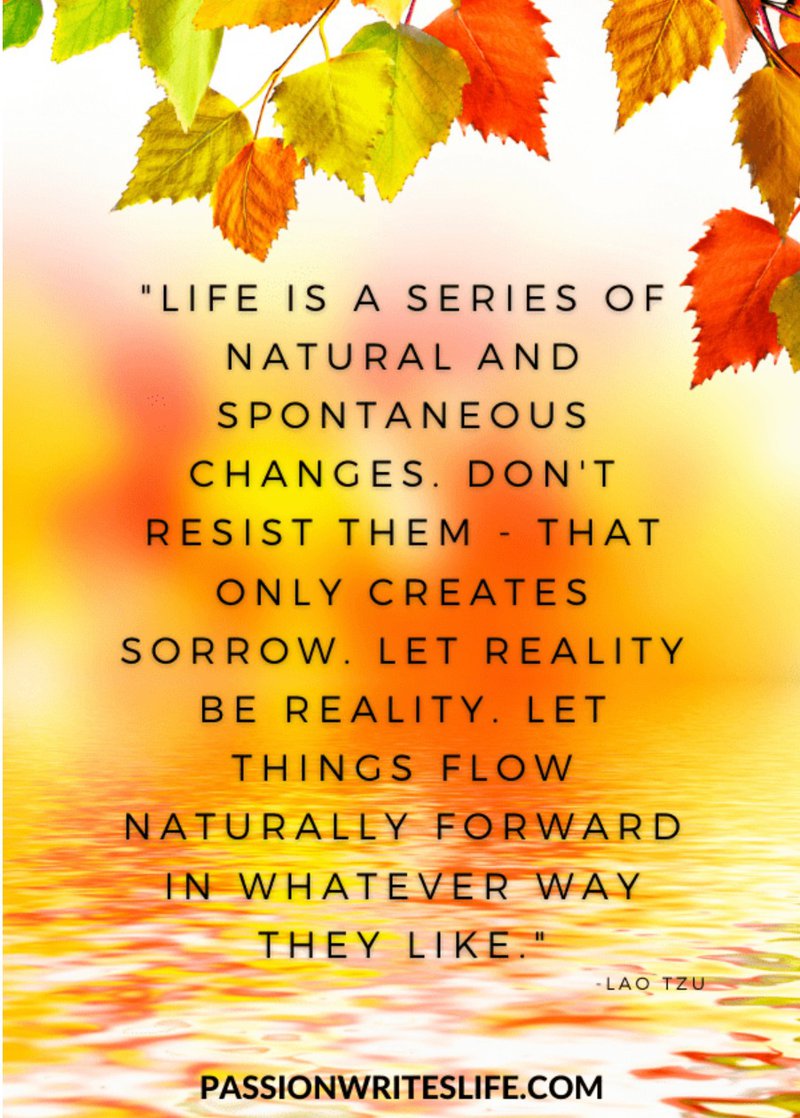🍁 How to Let Go Before It Hurts — Emotional Regulation for Real Change
Every autumn, nature puts on a masterclass in letting go. Think about it: the trees don’t fight it. They don’t panic about losing their leaves. They don’t cling to the branches out of fear they’ll never grow new ones. They trust the process. But people? We resist it with everything we’ve got. We usually have to be led kicking and screaming!
“The trees are about to show us how lovely it is to let the dead things go.”
We grip the things that keep us small like old stories, fears, relationships and jobs, old habits because even when they’re heavy, they’re familiar. Because “the Devil we know is better than the Devil we don’t.” How many people do you know who complain about their partner but would never leave them? Or they hate their job but they are too afraid to change it? We hold on to “what was” while quietly wishing for something new, then wonder why we feel so stuck between the two.
But you know what? Sometimes the universe is like: NOPE!! If you won’t move, I’m gonna make you! The relationship ends. The job falls apart. The burnout hits. We’re forced to change but not because we wanted to, but because we can’t take the discomfort of staying the same anymore.
But here’s the thing: you don’t have to wait for rock bottom.
Why wait for everything to get so bad that you absolutely have to change? Or wait to see what the universe has in store when you won’t take action? What if it’s realizing that holding on too tightly to what you’ve outgrown costs you more energy than change ever will?

Why Change Feels So Hard (Even When We Want It)
You already know that white-knuckle moment before a big change: the racing thoughts, the second-guessing, the stomach-drop feeling that says, “What if this doesn’t work?” “What if I fail and ruin everything?”
Your brain is a prediction machine. It wants certainty, control, and familiarity. When you try to change (even for an upgrade), your nervous system reads it as risk. The “scary unknown” triggers your amygdala, the part of your brain wired to keep you safe. And safety, to your brain, usually means “same.”
Brad Yates says that “self-sabotage is really just misguided self-love.”
That’s why people stay in jobs they hate, relationships that drain them, or mindsets that hurt them. The discomfort of the familiar feels safer than the uncertainty of growth. Except that you know deep down that safety isn’t the same as peace. You’re probably even mad at yourself for not taking action, aren’t you?
I know, I know. And trust me, this is the point where most people get stuck because they mistake emotional activation for a sign to stop. How do I know? This used to be me all day. That’s where emotional regulation comes in. And EFT Tapping, which I’ll tell you about in a minute.
Emotional Regulation: The Bridge Between Knowing and Doing
You can’t “think” your way out of fear logically even though you can definitely force it. You might even win. But you might even lose or have a panic attack because your nervous system isn’t on board with what you’re telling your brain and body to do. So what do you do to avoid this? You have to regulate the fear so you don’t self-sabotage.
Emotional regulation means being able to experience emotion without being hijacked by it. It’s your ability to notice fear, anxiety, or doubt — and stay in motion anyway. When you regulate your emotions, you stop reacting from the old pattern (“run, hide, freeze”) and start responding with intention (“breathe, notice, choose”). That’s the difference between talking about change and actually creating it.
And it’s not about suppressing emotion and ignoring it so you can push through. Suppression is emotional numbing such as the “I’m fine” mask you wear to get through the day. True regulation is feeling what’s real without letting it control your behavior.
A 2022 study in Frontiers in Psychology explored how people process emotion when they’re trying to change. The researchers found that simply reappraising a situation (trying to think about it differently) isn’t enough. What mattered was what they called total conviction — the moment a new perspective feels emotionally true.
In other words: knowing you “should” feel differently doesn’t change anything until your body believes it too. That’s why mindset work alone often can’t get you unstuck because your nervous system has to be part of the conversation.
Why We Wait Until It Hurts to Change
This probably won’t sound surprising to you but most people don’t change when life is comfortable. They change when the pain of staying the same finally outweighs the fear of doing something different. That might sound dramatic, but it’s the truth.
Do you stay in the job because “it pays the bills”?
Do you keep the friendship that drains you because “we’ve known each other forever”?
Do you keep proving yourself because you believe “this is just how life is”?
Then one day, you realize you’re exhausted, resentful, and quietly (or loudly) miserable because your life hasn’t expanded in years. The real question isn’t why you’re stuck. It’s why you’ve normalized feeling stuck.
The Hidden Fear We Have of Letting Go
Letting go isn’t just about leaving something behind — it’s about stepping into something unknown.
And the unknown triggers your survival instincts. That’s why “letting go” can feel unsafe, even if it’s the healthiest thing you could do. You might recognize yourself in these patterns:
For example, do you keep replaying “what if” scenarios to prepare for every possible failure? Do you overthink decisions because you don’t trust your intuition anymore? Do you hang onto people or habits because “at least I know what to expect”?
If the answer if yes but you don’t know how to change because that’s how you’ve always been, that’s where tools like EFT Tapping change everything.
How EFT Helps You Regulate and Release
If you’ve ever been told to “just calm down” when you’re stressed, you already know how useless that advice is! Seriously, though, has anyone in the history of anything ever actually calmed down because I know that doesn’t work on me! Why? When your nervous system is on overdrive, logic doesn’t stand a chance and anyone who has anxiety can already relate to that. This is where EFT (Emotional Freedom Techniques), also known as tapping, comes in.
EFT Tapping is one of those things that sounds strange until you try it (I know, I was like: how does tapping the face do anything?). You gently tap on specific acupressure points on the face and upper body while addressing what’s stressing you out. What you’re actually doing is sending calming signals to your brain, helping your body come out of fight-or-flight so you can breathe, think, and stop spinning.
Sounds too simple? I get it. I know when I tried it the first time 13 years ago, I was heading into full panic mode and I needed to try something to calm myself down after days of getting worse, not being able to eat, sleep or function before final exams during my master’s program. And you know what? I was able to successfully calm myself down. Also, the science is there as well as research shows EFT can lower cortisol (the body’s main stress hormone) by up to 25 percent in a single session. It’s been used successfully for anxiety, trauma, chronic pain, and performance pressure. In short, it helps your body remember what “calm” actually feels like.
Once your body relaxes, your brain can finally get back online. You stop reacting out of panic and start responding with clarity. You think better. You make decisions without overanalyzing every outcome. And instead of burning all your energy trying to keep it together, you can actually move forward.
That’s the real magic of EFT: it helps your body and mind get on the same page again. The more you tap, the easier it becomes to stay steady when life throws curveballs and re-calibrate when you feel out of control. You stop being hijacked by stress and start feeling grounded, clear, and capable—exactly how you’re meant to feel.The Real Cost of Holding On
Here’s something most people never realize: holding on and refusing to change doesn’t actually protect you from pain: it just guarantees you’ll experience it slowly in a painful, drawn out way.
When you cling to what you’ve outgrown, you end up dragging it into every new experience. You bring the same old belief and emotional baggage into a new job, a new relationship, a new opportunity. And then you wonder why it feels familiar. If your nervous system hasn’t learned to release, it repeats. Think about how many times you’ve said things like:
“Every time I get close to success, something goes wrong.”
“I attract the same kind of people.”
“I can’t seem to break this cycle.”
These are old patterns built on emotional memory and EFT helps disrupt those loops by calming the body while reframing the thought. You’re literally teaching your system: this time, it’s safe to do it differently. I’ll do it little by little and create new proof for myself. That’s how you stop repeating history and start writing something new.
Why Emotional Regulation Comes Before Action
The thing is that everyone wants to skip straight to the doing part. Set the goals. Make the plans. Power through. The problem is, if your nervous system is still in overdrive, your “action” isn’t coming from clarity — it’s coming from panic. You’ll rush, freeze, overthink, or burn out before you ever get traction.
That’s why emotional regulation always has to come first. When your body is calm, your brain stops scanning for danger and starts focusing on direction. You can actually think, decide, and follow through but not because you’re forcing it, but because it finally feels safe to move. When you take action from a regulated state, you don’t have to push so hard. You take smaller, smarter steps that actually stick. You recover faster when things don’t go as planned. And most importantly, you start to trust yourself again.
That trust is everything. It’s the foundation that turns momentum into real, sustainable change trust is everything. Because once your brain learns that change doesn’t equal danger, the floodgates open. That’s when the real growth begins.
The “Wow, That’s Me” Moment
If you’re reading this and thinking, “Yep, that’s exactly what I do,” good. That’s awareness — and it’s the first real step toward change. Your nervous system isn’t the enemy. It’s just been working overtime. It learned to keep you safe in ways that don’t fit who you are anymore. You don’t need to fight it. You just need to show it something different.
That’s what emotional regulation is about. It helps your body feel safe enough to let go of old patterns so you can finally do things differently. It’s the bridge between wanting change and being able to live it. EFT Tapping gives you a way to do this in real time — to stop the spiral before it takes over, to release tension before it turns into overwhelm, and to remind your brain that you’re safe, even when things feel uncertain.
That tiny shift when fear eases up just enough for you to take the next step; that’s where the real magic happens.
Why Autumn Is the Perfect Time to Let Go
Autumn has a way of calling us out. The trees don’t cling to what’s done — they just drop it and make space for what’s next. No drama, no overthinking, no “but what if I still need this leaf?” energy. Just… release.
“Holding on is believing that there’s only a past; letting go is knowing that there’s a future.” -Daphne Rose Kingma
It’s nature’s reminder that letting go doesn’t mean loss; instead, it means transformation. Letting go doesn’t always mean big gestures or emotional fireworks. Sometimes it’s just deciding you’re done carrying what’s been weighing you down. It’s closing the tab in your mind that keeps replaying old doubts and stories that don’t fit anymore.
Maybe it’s finally releasing the self-doubt that keeps you stuck at “almost ready.”
Maybe it’s loosening your grip on the belief that you have to be perfect before you start.
Maybe it’s realizing no one’s coming to give you permission — and that moving forward can simply be your next act of courage.
This season isn’t about starting over. It’s about shedding what’s heavy so you can move lighter into what’s next.

🍁 The Autumn Reset — Stop Waiting. Start Moving.
If you’ve been stuck in a loop of overthinking, procrastinating, or waiting for the “right time,” this is your sign to stop pausing your life. The Autumn Reset EFT Program is five private sessions (€499 VAT incl.) designed to help you finally move — with confidence, clarity, and follow-through that lasts.
Together, we’ll:
Start clearing the fears that keep you playing small — fear of judgment, failure, or not being ready.
Start uncovering real confidence — the steady kind that lets you speak up, take action, and follow through.
Start rewiring your nervous system for progress — so you can stay focused and consistent, even when it’s uncomfortable.
This isn’t about calming down — it’s about finally feeling safe enough to take the leap you’ve been planning all year. It’s about finishing 2025 in motion — not waiting for 2026 to “feel ready.”
€499 (VAT included)
5 private online sessions (60 min each)
Focus: releasing fear, rebuilding confidence, and creating consistent action before winter
Doors close October 31.
Don’t let another season pass on pause. The trees are already letting go. Maybe it’s your turn.
Book your Autumn Reset now → [Booking Link]
About Andrea Hunt:
I’m an EFT Tapping Empowerment Coach and I help ambitious professional women reach their goals faster by breaking free from fear, self-doubt, and impostor syndrome so they can build confidence like a muscle—one bold step at a time—and finally step outside their comfort zone to create the life they know they deserve.
Curious about EFT Tapping? Download my FREE EFT book and discover how tapping can enhance emotional resilience, improve mindset, and reduce perfectionism and negative self-talk.
➡️ Get Your Free Ebook Here to Learn the Healing Transformative Power of EFT Tapping https://bit.ly/3U2eHnw
➡️ Book a call with me here! https://bit.ly/4g4cIrD
➡️ Learn more about me: www.dreahunt.com












